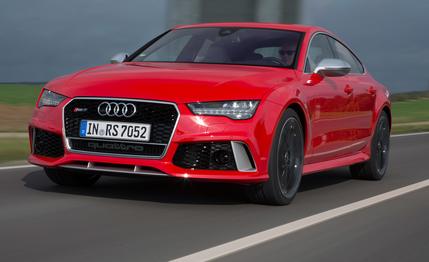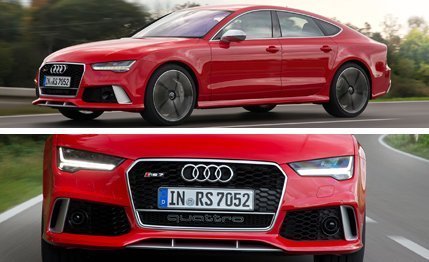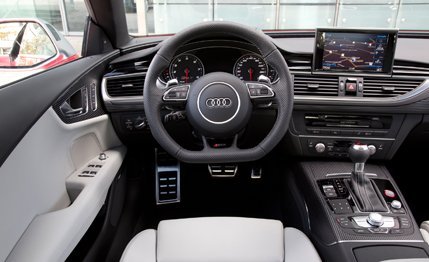
 First Drive Review
First Drive Review
We called the RS7 “Quattro's best work yet,” in a recent comparison test, which it won. The car is now even better. For 2016, the Audi RS7 sees subtle upgrades inside and out, much like those that apply to its stablemates, the A7 and the S7. The RS7 already was the freshest of the trio, having arrived here for 2014, so these changes are even less obvious.
Outside, it gets new head- and taillights similar to those that grace its less powerful siblings. But the style of the front bumper and lower air intakes remains almost identical to the pre-face-lift models (which should please current owners). With its large 20- or 21-inch wheels and matte-aluminum décor, the RS7 is the most impressive and perhaps the most harmonious in the lineup. Neither garish nor over-the-top, it does look imposing. With its new headlight contour, it reminds us of the original Audi Sportback concept that preceded the A7 on the show circuit.
Inside, the RS7 gets revised instrumentation with a larger driver-information display (now with Google Earth) between the tachometer and speedometer. An improved electronics architecture helps upgrade the graphics and the integration of the infotainment and telematics systems, now using LTE communications when available, and it is compatible with Siri Eyes Free. The MMI interface also gets refinements, making it easier to use, and the night-vision display is also improved. New color and wood options dress out the cabin.


Such luxuries have their appeal, but what makes the RS7 truly desirable is that it is one of the greatest performance sedans (well, hatchbacks) of all time, and there are no changes to its mechanical specification. It uses the same relatively compact, twin-turbocharged 4.0-liter V-8, out of which Audi squeezes a healthy 560 horsepower and 516 lb-ft of torque, the latter of which is served across a lofty plateau that stretches from 1750 to 5500 rpm.
The engine provides fantastic straight-line performance: Audi claims it will run from zero to 62 mph in 3.9 seconds, but we measured 3.4 seconds to 60 mph in a 2014 model. In Germany, the RS7 offers three different top-speed governors depending on the wheel/tire package; the top one lets it run all the way up to 190 mph. The U.S. most likely will get the mid-level governor, rated at 174 mph. Not a problem.
With the European fuel-consumption rating, however, Audi seems to be joking. The official rating of 25 mpg would require ruthless asceticism. Figure on 20 mpg if you’re feather-footing. Using the power liberally will cut that in half. We saw 9 mpg in that comparison test over a relatively short (150-mile) run of spirited motoring. With only 420 horsepower to tempt us, our long-term S7 is averaging 21 mpg.


Not just supercar fast, the RS7 sounds off with a corresponding, ultra-aggressive tone, menacing even at standstill. Wind out the gears, and the exhaust pops audibly at upshifts; easing off the gas produces a furious crackle; the whole symphony of intake, combustion, and exhaust underscores the reality that there are tightly controlled but massive explosions raging in the combustion chambers of this engine. The ZF-supplied eight-speed automatic responds so quickly that few will miss the S7’s dual-clutch box.
Never silent, the RS7 is nevertheless easily maneuverable and controllable on the street. Step up the pace, and it exhibits remarkable agility. The torque-vectoring rear sports differential is almost overly eager to help the driver throw the RS7 into corners; it can feel a bit artificial at times. Way up at the limits of adhesion, the powertrain, sports differential, and assistance systems have to work overtime and can no longer disguise the big hatchback's mass. Audi claims a curb weight of 4398 pounds; our comparison-test example registered 4453 on our scales, heavier than even the portly BMW M6 Gran Coupe and the Mercedes-Benz CLS63 AMG.
Expect the 2016 model’s price to stay near that of the current model, which lists for $107,425, before options. It’s easy to run it up over $130K. If you are serious about driving, start by choosing the RS7 Dynamic package that Audi recently added to the range: It packs a sports-tuned steel-spring suspension instead of the standard air suspension and comes with the fantastic performance exhaust system. Down the road, we anticipate that Audi will bump up the power, perhaps to 600 horsepower, to match or top the BMW and Mercedes-Benz competitors that now stand at 575 and 577, respectively. Until then, we stick to our verdict: This is Quattro's best work yet.